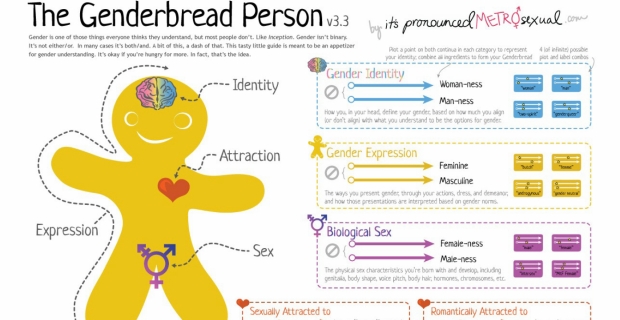
They used to say “Stay in school, boys and girls.” But if kids do so now, they may not be “boys and girls” — that is, not if some social engineers get their way.
In a shocking and disturbing example of political correctness, newly uncovered middle-school training documents in Lincoln, Nebraska, counsel teachers to avoid “gendered expressions” as part of an effort to alter the traditional understanding that mankind is divided into two sexes. The materials, revealed by Nebraska Watchdog, advise teachers not to call “students ‘boys and girls’ or ‘ladies and gentlemen,’ but to instead use more generic expressions like campers, readers, athletes or even purple penguins to be more ‘gender inclusive,’” reports the organization at its website. The social-engineering documents are entitled “12 easy steps on the way to gender inclusiveness…” and state:
• 1. Avoid asking kids to line up as boys or girls or separating them by gender. Instead, use things like “odd and even birth date,” or “Which would you choose: skateboards or bikes/milk or juice/dogs or cats/summer or winter/talking or listening.” lnvite students to come up with choices themselves.… Always ask yourself, “Will this configuration create a gendered space?”
• … 3. Provide an opportunity for every student to identify a preferred name or pronoun.… Invite students and parents to let you know if they have a preferred name and/or pronoun by which they wish to be referred.
• 4. Have visual images reinforcing gender inclusion: pictures of people who don’t fit gender norms, signs that “strike out” sayings like “All Boys …” or “All Girls …” or “All Genders Welcome” door hangers.
• 5. When you find it necessary to reference gender, say “Boy, girl, both or neither.” When asked why … emphasize to students that your classroom recognizes and celebrates the gender diversity of all students.
• 6. Point out and inquire when you hear others referencing gender in a binary manner.… Provide counter-narratives that challenge students to think more expansively about their notions of gender.
• 7. Look for examples in the media that reinforce gender stereotypes or binary models of gender.… When with others, call it out and interrogate it.
The guidelines also state in step 8, “Be intolerant of openly hostile attitudes or references towards others EVERY TIME you hear or observe them,” and in Step 10, “Avoid using ‘normal’ to define any behaviors.”
The documents have been handed out in only a limited number of schools so far, but apparently are intended for wider distribution, with Lincoln schools superintendent Steve Joel saying on radio host Kevin Thomas’s local show, “The expectation is that we’re going to do it [move forward with the program].” In his defense of the materials, he said he was “happy” and “pleased” and that “our position … is inclusiveness.”
And what will they be inclusive of when allowing “every student to identify a preferred name or pronoun”? Just consider a partial list of the 58 “gender” names Facebook offers to users:
• Agender
• Androgyne
• Androgynous
• Bigender
• Cisgender
• Cisgender Man
• Cisgender Woman
• Female to Male
• Gender Fluid
• Gender Nonconforming
• Gender Variant
• Genderqueer
• Pangender
• Trans
• Trans Person
• Transfeminine
• Transgender
• Transgender Female
• Transmasculine
• Transsexual
• Two-Spirit
As to the ideology this reflects, InfoWars’ Steve Watson writes, “Elsewhere in the documents used by teachers in Lincoln is a handout that defines ‘gender identity’ as ‘a psychological quality; unlike biological sex, it can’t be observed or measured, only reported by the individual.’” This is the idea that a person’s “gender” can be whatever he feels it is, that if a boy “identifies” as a girl — as has happened already in a number of schools — we must view and address him as one.
In fact, the Lincoln social engineers even went so far as to create a cartoon character (shown below) — patterned after a gingerbread man — to illustrate these concepts, along with diagrams outlining how “gender” is a continuum.

Of course, many find this assertion that perception is reality flabbergasting. As one commenter under a National Review piece on the Lincoln story pithily put it, “If one’s self-perception is wrong, then it’s a mental disorder. Otherwise we need to start calling anorexic girls “fat.”
And what we call things is at issue here. While Watson wrote in his very well-composed article that children are being exposed “to the notion that gender is defunct,” this is not true. It is the concept of “sex” that is being made defunct. As for “gender,” the problem is that it has been co-opted and misapplied — and then accepted.
In older dictionaries, “gender” is always defined as it is in my seventh printing, 1975 American Heritage School Dictionary, which states, “In grammar, one of a number of categories, such as masculine, feminine, and neuter, into which words are divided.” The term had rarely been applied to people — and never to merely their self-perception.
That is, until the early 1960s. This is when a now-discredited psychologist named Dr. John Money originated “gender neutrality” theory, the notion that the sexes were the same except for superficial physical attributes and that a person could live happily as whatever sex society conditioned him to believe he was. This idea held sway for a few decades until research in the 1990s demonstrated that sex differences are more than just skin deep and that men and women are different from the womb to the tomb. So we’ve gone from “gender neutrality” to “gender identity” without any stopover at sanity.
Of course, the list of “genders” has now metastasized far beyond Dr. Money’s humble and hoary hypothesizing. It’s part of the notion that we mustn’t put children in a “box” (except that which excludes traditionalism). But as I wrote last month:
While some complain about pigeonholing boys and girls, raising children is all about categorizing, molding, and limiting. And it isn’t just the so-called “gender straitjacket” that supposedly violates a child’s right to choose his own “gender.”… Just as psychologists define “gender dysphoria” — the belief that you’re one sex stuck in the body of the other — they also define “clinical lycanthropy,” the sense that you’re really an animal. Texas girl Sarah Rodriguez, for instance, insists she’s a “canine” and goes by the name Wolfie Blackheart. Despite this, we still pigeonhole children by putting them in clothing, and teaching them language, manners, and the whole range of human norms. We don’t refrain from limiting a child with a “species straitjacket” because he may one day conclude he’s a ferret.
And the fact that we can’t avoid putting people in boxes brings us back to Superintendent Joel. While he also said on Thomas’s radio show, “We don’t get involved with politics,” he is, like everyone else, applying an ideology. While he said “We don’t get involved with gender preferences,” he absolutely is involved in crafting curriculum and policy on the matter. And while he said “we can’t be judgmental,” the Lincoln social-engineering plan involves the judgments that it’s “right” to accept the “gender” agenda, “wrong” to scoff at it, and necessary to be “intolerant” of those who do. So one could say, using a Chesterton quotation’s construction, that there are only two kinds of people in the world: those who make judgments and know it — and those who make judgments and don’t know it. And the question a civilization always needs to ask is:
Are we making the right ones?



